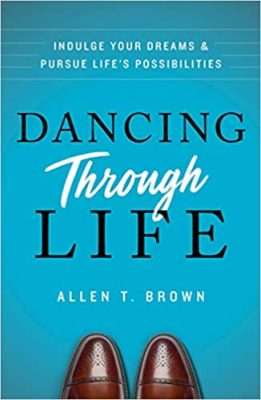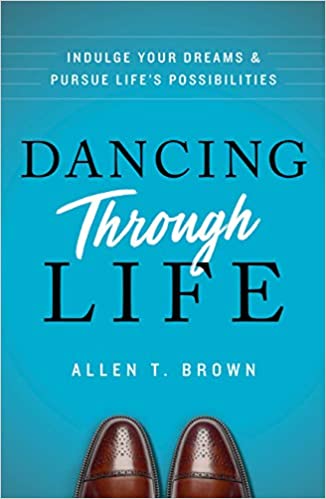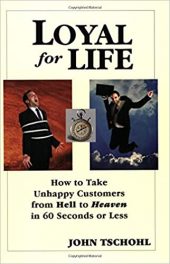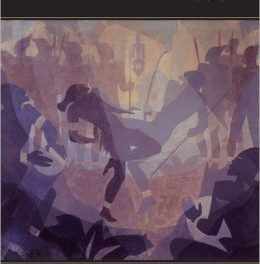 Author: Allen T. Brown
Author: Allen T. Brown
Publisher: Greenleaf Book Group Press – 140 pages
Book Review by: Kumar Balani
The author of this book Allen T. Brown learned to dance in his mid-eighties. Thereafter, he became the top amateur ballroom dancer in the United States. He also became a multi-millionaire, turning a $12 investment into $30 million. These two accomplishments – in dancing and in becoming a multi-millionaire – have to do, I believe, with your intense desire and your self-challenge to dare to do what you initially think is difficult, if not impossible.
How many people do you know, who have achieved seemingly impossible outcomes in their seventies, eighties, and even their nineties? Just two people who come to my mind right away are the founders of Kentucky Fried Chicken and of McDonalds.
Harland Sanders, born in 1890, was the founder of the Kentucky Fried Chicken franchise.
He struggled for many years as a cook and restaurant owner. Sanders identified the tremendous potential of franchising. Sanders opened the first Kentucky Fried Chicken restaurant in Salt Lake City, Utah, in 1952, when he was already 62 years old. By 1960, at the age of 70, he had finally found great success, owning a chain of some 200 KFC restaurants. In just three years, the size of his restaurant chain grew from 200 to 600. .
Ray Kroc, born in 1902, bought the McDonalds franchise from the company’s founding brothers Richard and Maurice McDonald in 1961 for $2.7 million when he was nearly 60 years old. He first met the brothers in 1954 and urged them to standardize everything about the franchise – its colors, designs, everything, particularly its food offerings.
He insisted that for customer satisfaction and company growth, the taste of each menu item must be the same every time, and in every location. He often encountered hesitation and even resistance from the brothers. But once Ray Kroc bought the whole chain, its growth was phenomenal. With an original $2.7 million investment, Kroc left an estate worth $2.7 billion.
In this book, the author discusses the lessons of success and happiness based on his own personal life experiences, positive as well as challenging. We provide an outline of them below, as a sort of ‘bird’s eye view’:
Introduction
- If You Have a Heart, You Have A Beat
- Get On The Dance Floor
- So You Think You Can’t Dance?
- Step by Step
- Set Your Playlist and Then Dance
- The Rhythm is Going to Get You
- Honor Your Partner; Honor Your Corner
- Dancing in the Rain
- Shut Up and Dance
Conclusion
Allen’s Library of Forward-Thinking Books
About the Author
At the end of each chapter is a list of exercises I strongly suggest you do, to get in touch with your inner thoughts and feelings. These are critical, and I believe they will do you good, as they did for me.
Below, from each chapter, I will quote for you with bolded and italicized words at times, what I feel is the message that brought true insight to me. For you, it could be a different message, based on your own collection of past experiences and the feelings you have today. Read each chapter to feel the message that resonates best with you.
- “Turn on the radio and watch what a small child does. She dances. She moves to the rhythm. Her legs bounce. Her head sways. Her hands wave in the air. She knows what to do. She knows what feels good. She knows what she wants…it wants, above all, to o feel alive and at one with what is going around her – a tiny dancer.”
- “I think that besides figuring out your own inner beat, the most important thing you can do in life is to step out of your comfort zone and get out on the dance floor. There is an old adage that everything you want is just too inches beyond your comfort zone. Most people never find out. ….too afraid to discover what is beyond it. Failure? Humiliation? Uncertainty? Perhaps. But what if it is bliss? Happiness? Joy?”
- What if I told you everything you want and desire is completely within your grasp? And what if I told you that all you have to do is simply changing the way you think? You see, our mind is both our enemy and our friend.
- “I was afraid to ask questions in class…I was sure if I did try to speak or raise my hand, everyone would ridicule me and think I was stupid…all that changed when my neighbor saw me trying to chase cattle by myself. My neighbor said: ‘Allen, never be afraid to ask questions’ In that brief sentence, he nailed what was holding me back in life: I was afraid of asking questions.”
- “Set SMART goals: Specific, Measurable, Attainable, Relevant, and Time-bound. Let me assure you, there has never been a straight line to success. Every person who has achieved anything knows struggle, failure, and seeming defeat. You are going to have days when you feel like it is impossible to go on. This is absolutely normal.”
- “Eliminate what you hate to do, and do more of what you love to do. One of the greatest joys and gifts of life is being able to use your God-given skills and talents. You truly begin to live when you are able to develop these talents in such a way that they delight and inspire others.”
- “And here’s the beauty of abundance thinking: it’s limitless…there is nothing more uplifting and more beneficial to your mood and overall well-being than taking the time to sit down and list all the people, things, and events you are grateful for.”
- “I have hiked Mount Everest to base camp. It took two weeks because we had to stop to acclimate every other day. I have done things in life I could never have dreamed possible when I was a boy on a farm. With each obstacle, you can discover unknown resources of strength, wisdom, and resolve.”
- Not many people like to hear this, but there comes a time in everyone’s life when you have to stop reading, stop talking, and just do it!
Oftentimes, the limits you impose on yourself – your self-limiting beliefs – work against you.
I recall my own feelings and thoughts, when my guidance counselor Fred Anthony Cabbab at the Catholic institution San Sebastian College in Manila thought that I could serve our student body exceptionally well and bring nationwide prestige to the school by running for president of our high school student council.
During the summer break in 1966 between my junior and senior year, he called me to meet with him. He urged me strongly to run for this leadership position. I told him: Me? I am not Filipino, and I am not even a Catholic. How do you expect me to run, much less win this election, I asked him. He calmly and simply said: Run Kem, run. I will guide you to victory. After all I am a guidance counselor, right? Simply said, he believed in me more than I believed in myself. I not only ran, I won this election by a landslide victory, garnering 85 percent of the votes cast.
Author
Allen T. Brown began his education when he was 17. He climbed aboard a freighter transporting iron ore from Canada to Chicago. Attachments to friends and relatives were severed and freedoms soon revealed themselves.
After his experience on the freighter, Allen became even more curious about what the world had to offer, so he joined the Army. As a soldier he spent some time in Germany and made many new friends who encouraged him to read and study, which eventually led him to attend college. After graduating from the University of Michigan with a bachelor’s degree in literature, he moved to Colorado and became headmaster of Vail Country Day School.
At the time, Vail was just beginning to become the popular skiing and vacation hamlet it is today, and Allen was surrounded by builders. One day, he heard one of the developers say, “I will have the law changed if it interferes with what we need to do.” From this statement grew an understanding that we have many options.
Allen made his fortune in Vail and California turning $12 into $30 million. He maintains shopping centers in Colorado and California.
Allen never ceases growing and continues his education to this day, becoming one of the top amateur ballroom dancers to learning classical piano. He maintains the courage to be curious, and of course the courage to act on his curiosity. He feels that only the impossible is worthy of his time and mind.







